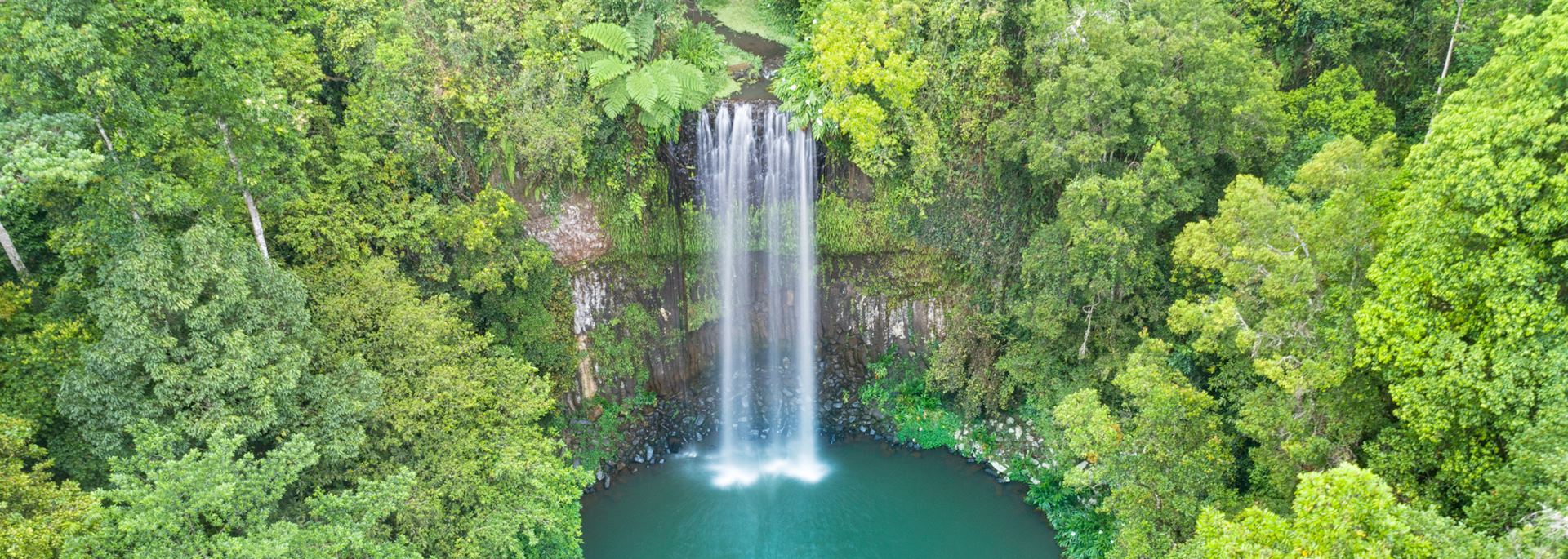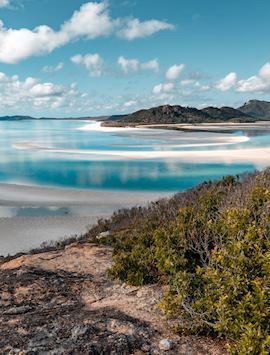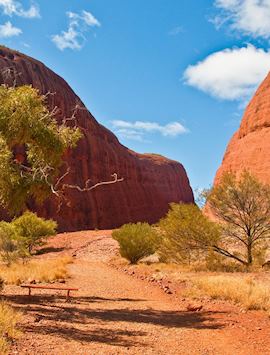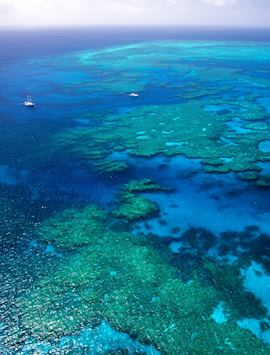By Australia specialist Connor
From rainforest to reef, the diverse landscapes of Queensland are home to a surprising assortment of animals that you can discover in this Australian state.
A rainbow of fish darting over the Great Barrier Reef. Crocodiles sunning themselves on the muddy banks of the Daintree River. Getting up close and personal with protected kangaroos, wallabies, and koalas in Port Douglas. I’m always floored by how many of Australia’s renowned animals you can find in Queensland. Here’s my choice for the top five places to encounter wildlife on a visit.
Bird watching in the Atherton Tablelands
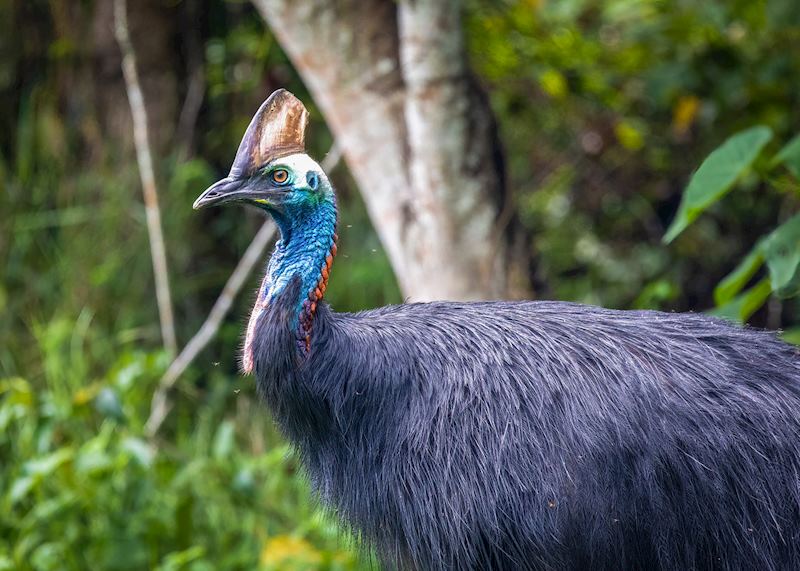
Sitting out on the porch at Rose Gums Wilderness Retreat in the tropical rainforest of the Atherton Tablelands, a cacophony of bird calls rang out through the air. The elevated deck was surrounded by trees, making me feel entirely immersed in the forest. All I had to do was sit back and relax while flocks of bright-white cockatoos flew by, and eastern whipbirds sang their distinctive tune. The whipbirds’ call is like nothing I’d ever heard — it sounds like the zap of a laser or a crack of a whip, a comparison that earned this mohawked grey-and-yellow bird its name.
The bird life is so diverse at Rose Gums that the hotel even has a page on its website dedicated to listing the more than 160 species that you might be able to see while staying here. This includes endemic species, such as the grey-headed robin, mountain thornbill, and Atherton scrubwren.
Some of the rooms have picture windows framing the bathtub, so you can even look for birds while soaking in an indulgent bubble bath. If you’d rather be one with the brush while birding, you can explore the 10 km (6 mi) of walking tracks on the property.
You can also find cassowaries here, a large, flightless, and surprisingly fast bird that stands out for its unique plumage of black quill-like feathers topped by a red neck, blue face, and a keratin crown on its head. Cassowaries also have wolverine-sharp nails on three of its toes and are known for scratching vehicles. While sometimes elusive in other parts of Queensland, cassowaries are so abundant here that the hotel asks you to place a protective cover on your car so the birds don’t wreck the paint job.
Marine life on Great Barrier Reef
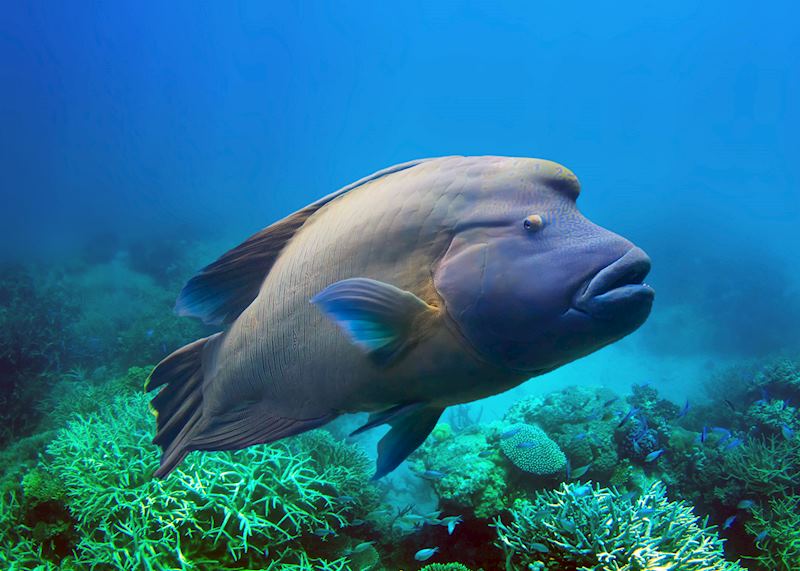
Snorkelling over the Great Barrier Reef, not only can you see the orange-and-white striped clownfish, but many others of ‘the Great 8’ — eight charismatic residents of the biodiverse reef. The list also includes sharks, sea turtles, potato cod, Māori wrasse, giant clams, manta rays, and whales.
I remember the feeling of the refreshing seawater caressing my skin as I gazed down into a watery world below, watching grey reef sharks working their way through the water and moray eels peeking out from their lairs beneath mounds of coral. Others on my dive boat spotted sea turtles gliding by, and our snorkel guide talked about the tiger sharks and hammerheads that can be found along the reef.
While there’s been much discussion over the overall health of the reef in recent years, I found the reef was incredibly vibrant. The spiny branches of staghorn coral, some growing to more than two m (6.5 ft) tall, towered over the seafloor. Meanwhile, the layered spirals of plate coral have also been reported by the Australian Institute of Marine Science to be regenerating their habitats at a 14 times higher rate — that’s two decades faster — than other coral types.
I was also entranced by brain coral, covered in a maze of grooves that make them look indeed just like a brain, and the undulating mushroom corals, which seem to change their hue in different angles of light.
Manta rays, whales & sea turtles on the southern reef
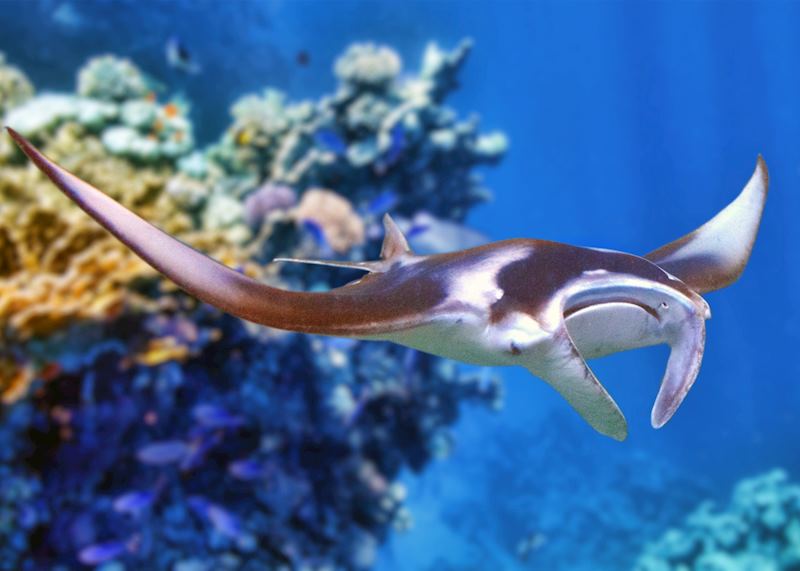
Visiting the Great Barrier Reef in Queensland is all about finding the right experience for you, which might include an overnight stay at one of the outlying islands on the southern stretch of the reef. This includes the rustic rooms and tents on Lady Elliot Island and a more sophisticated stay on Heron Island. At both hotels, the reef is so close to the shore that you can wade into the water and instantly be immersed in vibrant marine life.
For eco-focused, solar-powered lodging, plot a course to Lady Elliot Island, but for a bit more luxury, I recommend a stay at the Heron Island Resort. Set on its own little stretch of reef, you can arrive to Heron Island by ferry, or swoop in more swiftly on a seaplane or helicopter. Heron Island has the feeling of a Robinson Crusoe's desert island with a smattering of lavish trappings, like waterfront massages and wine-and-cheese sunset cruises, thrown in for good measure. There’s a wide mix of rooms available, from the simple and comfortable Turtle Rooms to the beachfront Heron Suites.
On both Lady Elliot and Heron, you’ll have the chance to see manta rays dancing gracefully in the sunlight-dappled sea. On Heron Island there’s the added allure of the loggerhead and green sea turtles, which nest here from November to March each year — the eggs usually hatch January to May. You can also look for humpback whales, which pass by the island from June to September.
Crocodiles in the Daintree Rainforest
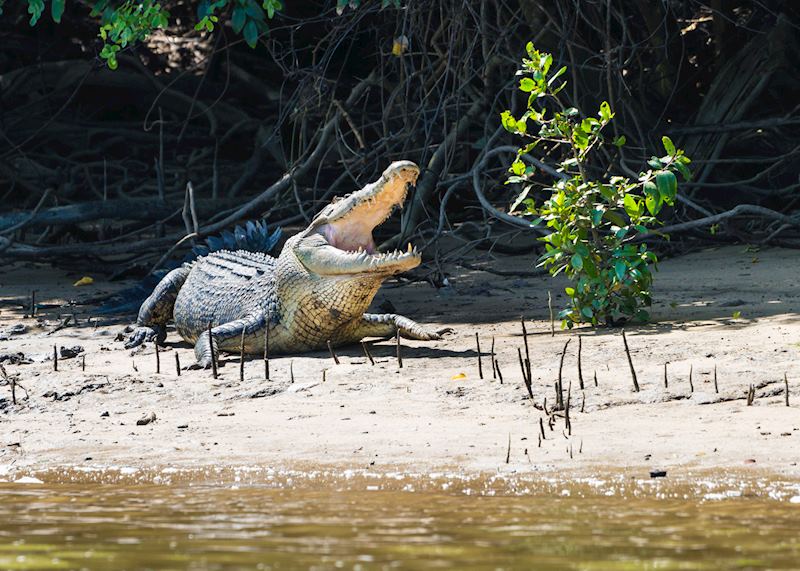
Beyond the reef and beaches of Queensland, you’ll find the Daintree Rainforest, the oldest rainforest in the world. This is home to a number of reptiles small and large, ranging from spiny Boyd’s forest dragon lizards, which dart up the high trees, to the saltwater crocodiles in the eponymous river.
Boarding a river boat, you’ll travel down the Daintree River to look for crocodiles, some of which grow up to 5 m (16 ft) in length. As you motor along, you can also glimpse snakes hanging from tree branches and birds flying overhead. The boat’s captain and guides are so well acquainted with the area that they know the crocs by name — they could differentiate between the giant reptiles and told us all about the history of each.
The boat stays a comfortable distance from the big reptiles so as not to disturb them. I was there in June — Australia’s winter — when the cold-blooded creatures hunker down a bit. I still saw them lounging their scaly bodies on riverbanks, eking out the sunlight, but our guide said that in summer they’re much more active. This activity ticks up a notch during mating season from November to February when they get much more territorial and more likely to bare their sharp teeth.
Kangaroos, wallabies & koalas in Port Douglas
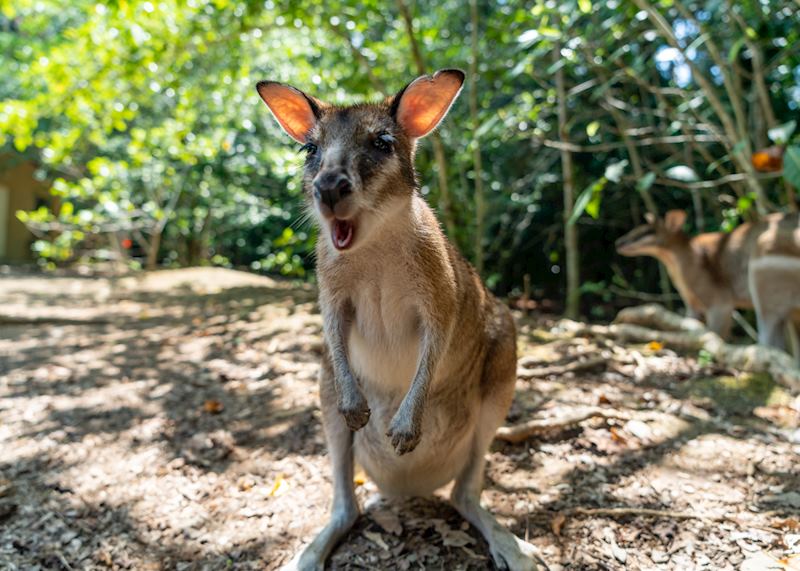
In a country that’s known for its singular wildlife, few species are more popular more than kangaroos and koalas. There’s a place in Queensland where you can see both of these sought-after Australian animals, as well as emus, kookaburras, wallabies, possum, pythons, crocodiles, and many more.
I suggest a private tour the Wildlife Habitat in Port Douglas, a wildlife sanctuary established for the protection, conservation, and observation of animals. The two-hour private tour is designed around you, so guides can take you and your group to the animals that you want to see most.
During the tour, you’ll have a chance to meet with a wildlife keeper and watch a personal reptile presentation. A private tour is also the only way to visit the Tropical Animal Rehabilitation Centre to learn about the Wildlife Habitat’s rescue efforts.
You can also partake of the rare chance to interact with some of the animals. While holding a koala isn’t something I’d usually recommend, the way they handle it at the Wildlife Habitat is very different. The koala won’t be whisked from person to person for a photo op. Instead, you’ll enter the koala enclosure one at a time with the wildlife keeper there ensuring the protection and comfort of the koala at every step.
Read more about trips to Australia
Start thinking about your experience. These itineraries are simply suggestions for how you could enjoy some of the same experiences as our specialists. They're just for inspiration, because your trip will be created around your particular tastes.
View All Tours in Australia
